外研英语必修3Module3The Violence of Nature单元课件 (5课时 共52张PPT)
文档属性
| 名称 | 外研英语必修3Module3The Violence of Nature单元课件 (5课时 共52张PPT) |
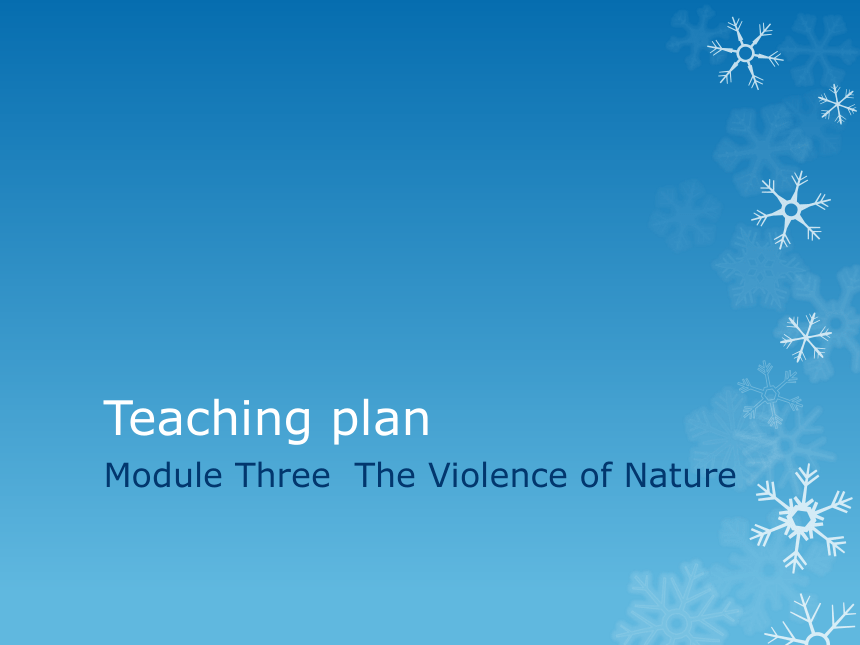
|
|
| 格式 | zip | ||
| 文件大小 | 180.4KB | ||
| 资源类型 | 教案 | ||
| 版本资源 | 外研版 | ||
| 科目 | 英语 | ||
| 更新时间 | 2020-04-08 00:00:00 | ||
图片预览


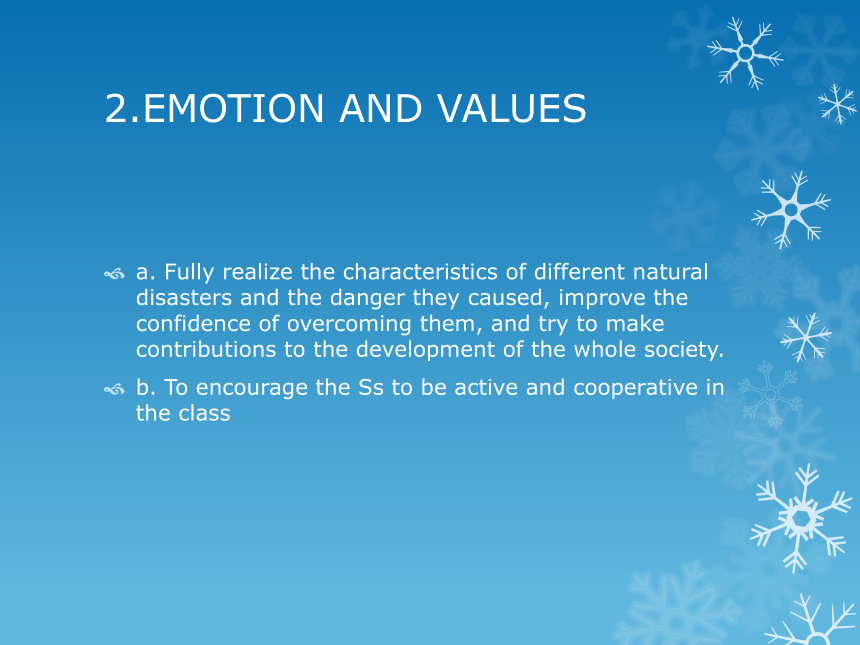


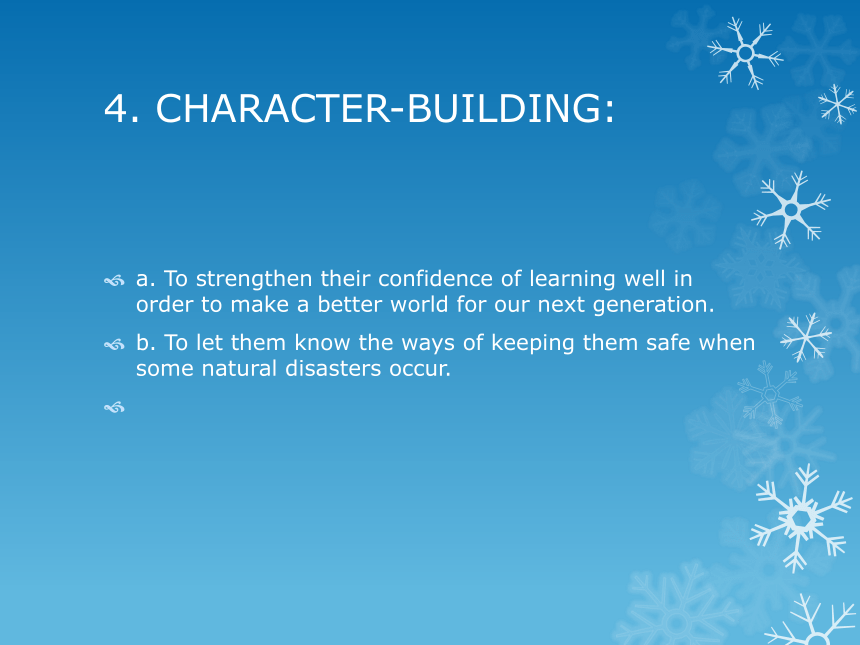

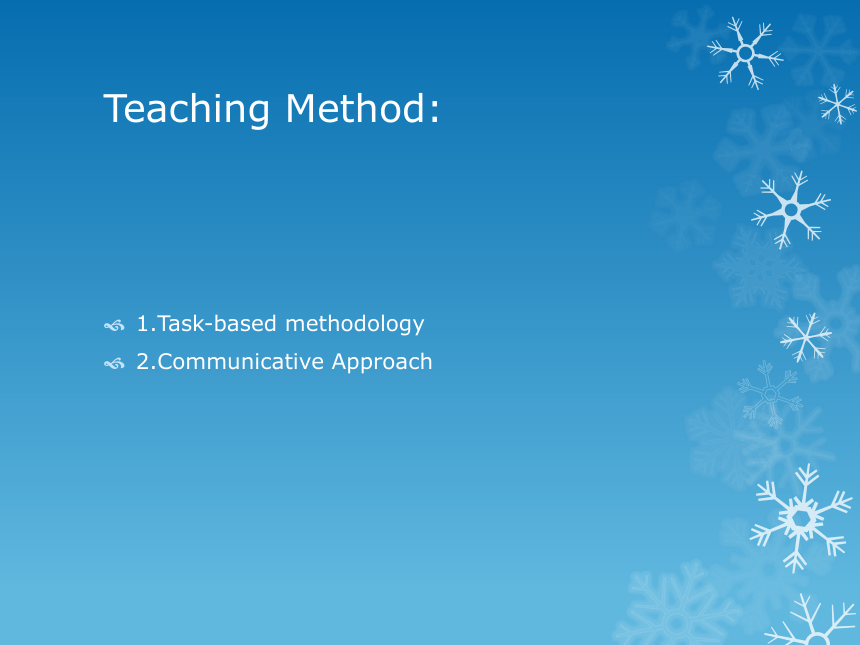
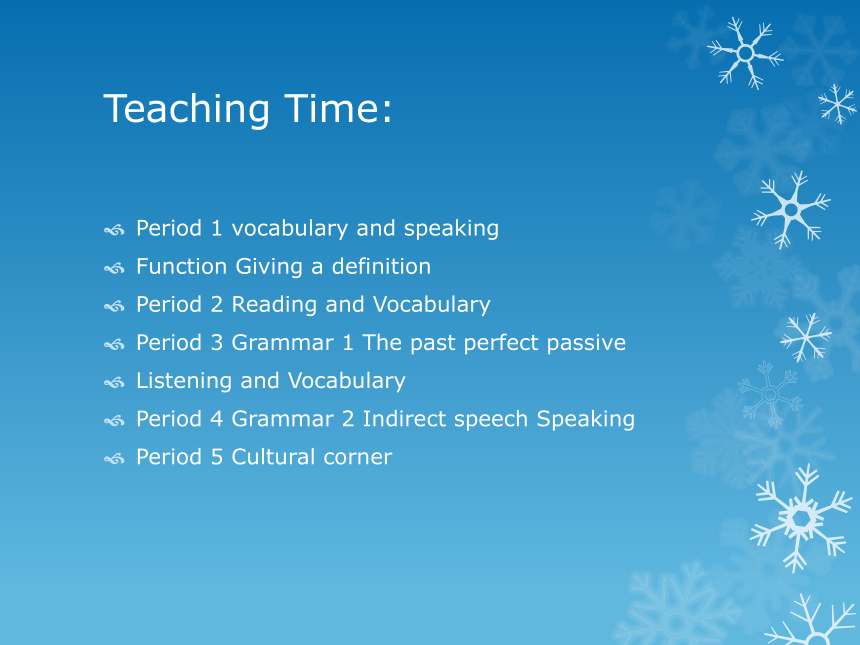
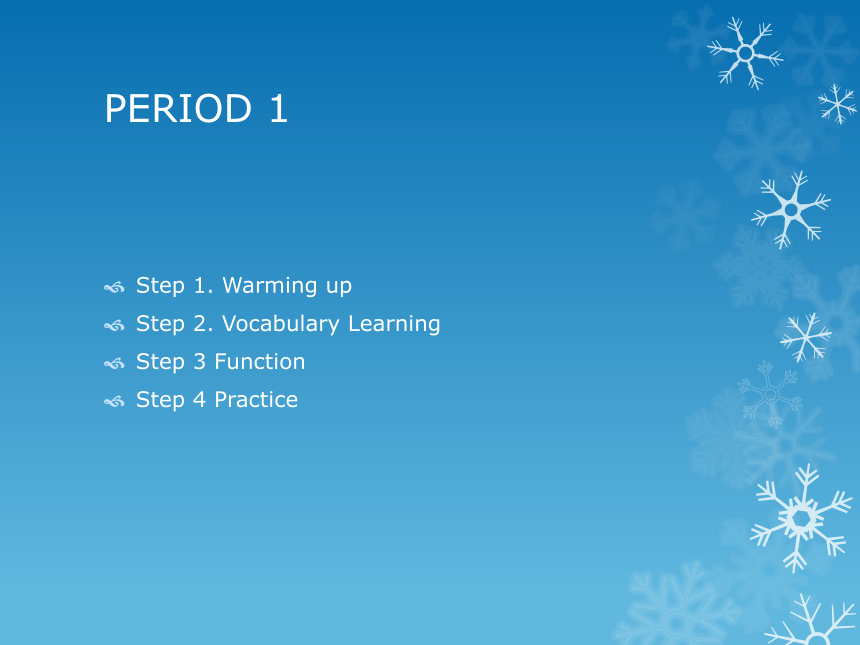
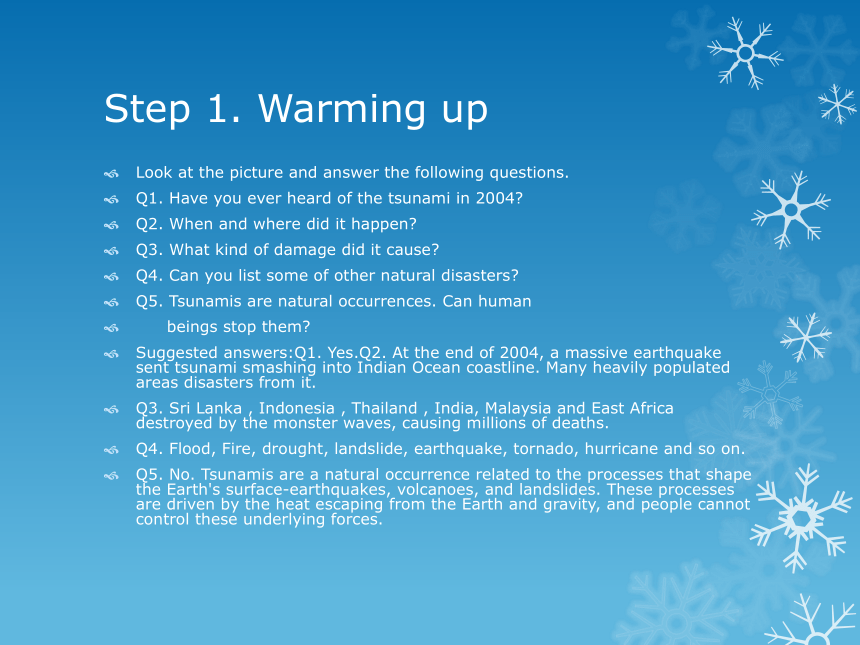
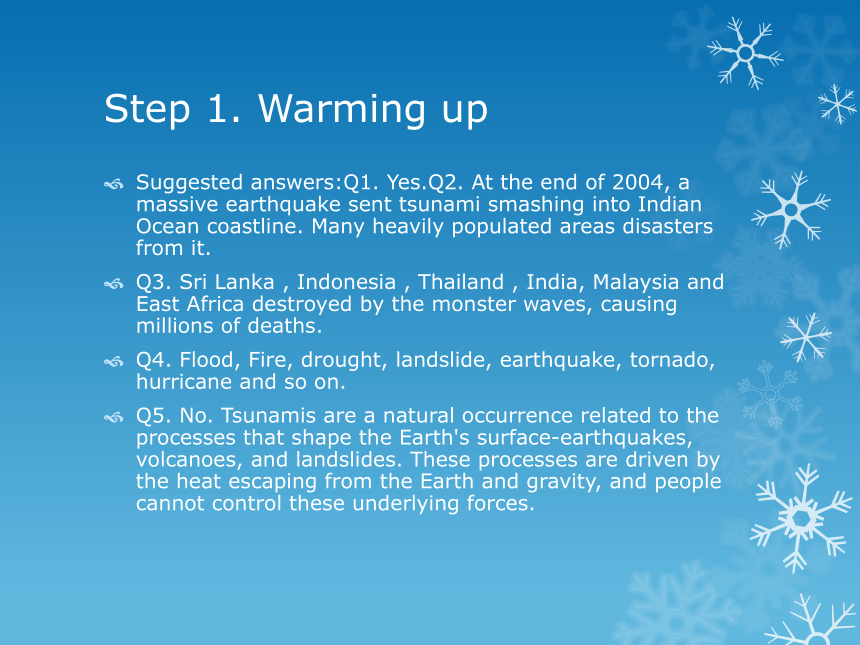
文档简介
(共52张PPT)
Teaching plan
Module Three The Violence of Nature
Teaching Aims:
1. KNOWLEDGE AND SKILL
2.EMOTION AND VALUES
3. CROSS-CULTURAL AWARENESS
4. CHARACTER-BUILDING:
2.EMOTION AND VALUES
a. Fully realize the characteristics of different natural disasters and the danger they caused, improve the confidence of overcoming them, and try to make contributions to the development of the whole society.
b. To encourage the Ss to be active and cooperative in the class
1. KNOWLEDGE AND SKILL
a. Get the general information about the violence of nature.
b. Using the Attributive Clause to explain words..
c. Improve the students' ability to give definitions of words.
d. Know the common enemies of our human being - natural disasters and the ways of surviving when one occurs.
e. To grasp the usage of the past perfect passive and indirect speech.
3. CROSS-CULTURAL AWARENESS:
a. Understand the natural disasters of different area and multi-form intensity of all parts of the world
4. CHARACTER-BUILDING:
a. To strengthen their confidence of learning well in order to make a better world for our next generation.
b. To let them know the ways of keeping them safe when some natural disasters occur.
?
Difficulties and Importance:
1.Learn how to definite words, using the Attributive Clause
2. How to change the direct speech into the indirect ones.
3.Improve the student's ability of grasping the general idea of the passage.
Teaching Method:
1.Task-based methodology
2.Communicative Approach
Teaching Time:
Period 1 vocabulary and speaking
Function Giving a definition
Period 2 Reading and Vocabulary
Period 3 Grammar 1 The past perfect passive
Listening and Vocabulary
Period 4 Grammar 2 Indirect speech Speaking
Period 5 Cultural corner
PERIOD 1
Step 1. Warming up
Step 2. Vocabulary Learning
Step 3 Function
Step 4 Practice
Step 1. Warming up
Look at the picture and answer the following questions.
Q1. Have you ever heard of the tsunami in 2004?
Q2. When and where did it happen?
Q3. What kind of damage did it cause?
Q4. Can you list some of other natural disasters?
Q5. Tsunamis are natural occurrences. Can human
beings stop them?
Suggested answers:Q1. Yes.Q2. At the end of 2004, a massive earthquake sent tsunami smashing into Indian Ocean coastline. Many heavily populated areas disasters from it.
Q3. Sri Lanka , Indonesia , Thailand , India, Malaysia and East Africa destroyed by the monster waves, causing millions of deaths.
Q4. Flood, Fire, drought, landslide, earthquake, tornado, hurricane and so on.
Q5. No. Tsunamis are a natural occurrence related to the processes that shape the Earth's surface-earthquakes, volcanoes, and landslides. These processes are driven by the heat escaping from the Earth and gravity, and people cannot control these underlying forces.
Step 1. Warming up
Suggested answers:Q1. Yes.Q2. At the end of 2004, a massive earthquake sent tsunami smashing into Indian Ocean coastline. Many heavily populated areas disasters from it.
Q3. Sri Lanka , Indonesia , Thailand , India, Malaysia and East Africa destroyed by the monster waves, causing millions of deaths.
Q4. Flood, Fire, drought, landslide, earthquake, tornado, hurricane and so on.
Q5. No. Tsunamis are a natural occurrence related to the processes that shape the Earth's surface-earthquakes, volcanoes, and landslides. These processes are driven by the heat escaping from the Earth and gravity, and people cannot control these underlying forces.
Step 2. Vocabulary Learning
Match the words in the box with their definitions.
Flood hurricane lightning thunderstorm tornado
1. a lot of water in an area which is usually dry
2. a very strong wind or storm
3. a lot of rain falling quickly, with loud noises and flashes of light
4. the flash of light which happens during a thunderstorm
5. a column of air that turns very quickly.
Step 2. Vocabulary Learning
Suggested answers:
A flood is a lot of water in an area which is usually dry.
A hurricane is a very strong wind and storm.
Lightning is the flash of light which occurs during a thunderstorm.
A thunderstorm is a lot of rain falling quickly, with loud noises and flashes of light.
A tornado is a column of air that turns very quickly.
Step 3 Function
Try to find the common characteristic of the sentences above.
Suggested answers:
> Each sentences gives a definition of a word.
> The Attributive Clause appears in each sentence.
> When we give a definition of a word, the Attributive Clause is usually necessary and hopeful. We'd better learn to use the structure "A is B that/which"
Step 4 Practice
Give definitions of the words following the pattern "A is B that/which".
An earthquake a volcanic eruption a plane crash
Suggested answers:
1. An earthquake happens when the earth shakes because of movement underground.
2. A volcanic eruption is that lava and ash coming out of a volcano.
3. A plane crash is that a plane stopping flying and crashing into the earth.
Step 4 Discussions
4. Which kind of these natural disasters have ever experienced? Can you describe it?
5. Have you ever read a news story about one of the events? Can you describe it?
6. Do you know anything about the events? For example, what causes them?
Homework:
(1)Surf the Internet in order to have a better understanding of natural disasters.
(2)Preview the passage in Reading and Vocabulary.
PERIOD 2
Step 1 Pre-reading
Step 2. While-reading
Step 3 Post-reading
Step 4 Language Explanations
Step 1 Pre-reading
Read about the Gulf Steam and check the meaning of the words:
1, What is a current ?
(a) A kind of electricity (b) A movement of water
(c) A kind of wind
2, What kind of things flow ?
(a) Water (b) Time (c) Money
3, If two places are on the same latitude ,they are on the same line _____
(a) east/west
(b) north/south
Suggested answers :b. a . a
Step 2. While-reading
a. Skimming
Read the passage quickly and silently. Find the words and expressions in the passages and match them with the definition.
bury disaster feather fur occur tropical
1 you can see this on an animal __________
2 describing the hottest parts of the earth, north and south of the equator__________3 a terrible event _________
4 you can see these on a bird _________
5 to place in the ground or tomb ___________
6 to happen __________
Suggested answers:
1. fur 2. tropical 3. disaster 4. feather 5. bury 6. occur
Step 2. While-reading
b. Detailed-reading
Read the passage carefully and answer the following questions.
1. How strong are tornado winds?
2. What can happen to furniture when a house is destroyed by a tornado?
3. How many tornadoes are there in the US every year?
4. How many people died in the worst tornado of all time?
5. What happens at sea during a hurricane?
6. When was the worst hurricane of all time?
7. Was the actor Charles Coghland killed in it?
8. What happened to him after the hurricane?
Step 2. While-reading
Suggested answers:
1. More than 400 km/h.
2. It stays where it was.
3. About 800.
4. More than 700.
5. It has huge waves.
6. 8th September, 1900.
7. No, he wasn't.
8. His coffin was dropped in the sea by a hurricane and carried to Canada by the Gulf Stream.
Step 3 Post-reading
Read the passage again and fill in the form with suitable words. Tornado Hurricane Definition Times Place Phenomena
Bad results
The worst example you know
Suggested answers :Tornado Hurricane Definition A rotating column of air from a thunderstorm to the ground.
Strong tropical storm.Times800 in the US each year
Step 3 Post-reading
6 Atlantic hurricanes each year Place From Texas in the southeast to South Dakota in the north
Occur in the southern Atlantic Ocean, the Caribbean Sea and the Gulf of Mexico Phenomena Have winds of more than 400 kilometers per hour
Violent winds of 120 kilometers per hour or more,
Bad results
Pick up cars, trains and even houses and put them down in the next street; take the fur and feathers off; destroy houses but leave the furniture where it was
Cause huge waves, heavy rain and floods
The worst example you know
Occurred in 1925
Occurred on the 8th September 1900 in Galveston, Texas.
Step 4 Language Explanations
【词条1】occur
【课文原句】Almost all of them occur in the US, in the area from Texas in the southeast to South Dakota in the north. (Page23)
【点拨】occur此处意为"发生",不及物动词,没有被动语态。如:
About 400 earthquakes occur worldwide every day, and more than a hundred thousand in a year.
【拓展】happen, occur, take place辨析
1. happen多用于偶然事情的发生,后面可跟happen to do sth 意为"碰巧,恰巧";happen to sb意为"......发生在某人身上" 。如:
Do you happen to know his telephone number?
If anything happens to you, tell me at once.
2. occur多指意外事故、自然灾害的发生,虽也指"偶然性",但程度比happen弱。Occur的常见搭配还有:sth occur to sb意为"突然想到......"。如:
The terrible traffic accident occurred on the No 318 highway in the morning.
This idea suddenly occurred to me.
3. take place不带有"偶然"之意,常指经过安排的事情的发生。如:
The May 4th Movement took place in 1919.
Step 4 Language Explanations
【词条2】cause
【课文原句】There are violent winds of 120 kilometres per hour or more, which cause huge waves, heavy rain and floods. (Page 25)
【点拨】
cause 此处意为"导致、引起",后接名词、代词作宾语,也可接不定式作复合宾语,还可接双宾语。如:
What caused his illness?
The old car has caused me a lot of trouble.
Step 4 Language Explanations
【拓展】
1. cause 也可作名词,意为"原因,起因",后可接of 短语或不定式。如:
The cause of the accident was carelessness.
2. cause 和reason
(1) cause强调导致某种结果的原因,即指事物发生的直接原因。如:
The heavy rain was the cause of the flood.
(2) reason 作名词,意为"理由,原因",着重指在逻辑推理上引出的结论的原因,其后介词多用for。如:
He has no good reason for doing that.
注意:cause 后不接why 引导的定语从句,而reason 后则可。如:
The reason why he died young was that he didn't pay attention to his health.
Step 4 Language Explanations
【词条3】destroy, furniture, leave
【课文原句】They can destroy houses, but leave the furniture inside exactly where it was. (Page 23)
【点拨1】destroy vt. 在此处意为"破坏, 毁坏"。如:
The building was completely destroyed by the big fire.
【拓展】destroy, injure, damage
destroy指通过某种有力的或粗暴的手段使之毁灭或无用,一般很难修复。如:
All his hopes were destroyed by her letter of refusal.
damage 指"损害,损失",损坏后价值或效率降低,一般是部分性的,还能修复,多用于无生命名词。如:
The earthquake damaged several buildings.
injure多指意外的伤害,在事故中受伤,大多造成容颜、功能的损害等。如:
One of the players injured his knees and was carried off.
【点拨2】
leave 此处作"使......处于某状态"讲,宾补可以是介词短语、形容词、分词等。如:
Leave the door open, please.
Don't leave her waiting outside in the rain.
【拓展】leave sb. to do sth. 意为"交给(委托)某人干某事",如:
She will leave me to look after her baby.他要委托我照看她的孩子。
Step 4 Language Explanations
【词条4】 put up, put down
【课文原句】Tornadoes can pick up cars, trains and even houses and put them down in the next street-or even in the next town. (Page 23)
【点拨1】
pick up 在此句中意为"卷起、掀起"。如:
The wind from northwest picked up dust and leaves on the ground.
【拓展】 pick up的常见意思还有:
1. 用车去接某人。如:
I'll pick you up on the corner of the street at three o'clock.
2. 偶然获得,学会(知识、语言等)。如:
I picked up French when I lived in France.
Step 4 Language Explanations
3. 振作起精神;恢复健康。如:
Pick up our courage and we will succeed at last.
【点拨2】put down 在此处意为"放下"。如:
The PLA men ordered the enemies to put down their arms.
【拓展】put down还有"记下,写下"之意。如:
We should listen to our teacher carefully and put down the notes well in class.
【词条5】
【课文原句】
On average, there are 800 tornadoes in the US each year, causing about 80 deaths and 1,500 injuries. (Page 23)
【点拨】
on average = on an / the average 此处意为"平均",是一个副词短语。如:
How many classes do you have every day on average?
Homework:1. Retell the extraordinary event after class. 2. Finish the exercises 10-12 on page
PERIOD 3
Step 1 Presentation
Step 2. Explanation
Step 3 Practice
Step 4 Listening
Step 1 Presentation
Look at these sentences and answer the questions.
By the time the tornado ended, more than 700 people had been killed.
Coghlan traveled back to Canada after he had been buried in Texas.
1. Which event happened first?
a. the tornado ending b. 700 people dying
c. traveling back to Canada d. being buried in Texas
2. How can you show that one event happened before another?
Suggested answers:1. d2. By using a tense which is further in the past (in this case the past perfect passive)
Step 1 Presentation
1. 被动语态
The Passive Voice
构成:be+及物动词的过去分词
主动语态:Workers make cars.
被动语态:Cars are made by workers.结论:谓语动词的执行者作主语,谓语动词为主动语态。
谓语动词的承受者作主语,谓语动词为被动语态。
主要用法:
(1)当我们不知道动词的执行者是谁,或者动作的执行者是谁并不重要时,需要用被动语态。
e.g. Rice is grown in North China.
Silk is produced in Hangzhou.
(2)当我们需要强调动词的承受者时,常用被动语态。
e.g. This knife is used for cutting paper.
The key is used for looking and opening the door.注意:A. 不及物动词通常不能构成被动语态。
B. 情态动词的被动语态由"情态动词+be+及物动词的过去分词"
be随着人称和时态而变化。
Step 1 Presentation
2. 过去完成时态的被动语态
过去完成时表示过去某个时间之前已经发完成的动作,即过去完成时的动作发生在"过去的过去"。使用过去完成时,句子中通常要有明显的参照动作或时间状语,这种时态一般不孤立使用。其构成形式是had been/ done被动形式是had been done。
They said that their work had been finished.
他们说他们的工作已经完成了。
He said that when to leave had been decided.
他说已经决定了什么时候离开。
By the time I arrived at the bus station, my friend had been picked up.
我到达车站时,我的朋友已经被人接走了。
The work was done earlier than it had been planned.
工作比我原先计划的要早
My computer had been all right until last Monday.
我的计算机直到上星期一才恢复正常。
Step 3 Practice
Passage A
I am pleased to hear that a new car factory ________________ (set up) in our city. The new car factory ____________ (not , build) in the centre of the city, but in one of the suburbs. This project_______ (agree) on last month and it_______ (finish) by 2005. many people think that this is good news for the people of the city. Because it ______ (can. bright) a great many jobs to the works. New businesses ____________ (start) in the city, so there ________ (be) plenty of offices, factories and other building for the new companies. New roads _______ (build),too. Cars ________ (take) by railway to many parts of the country. The port near the city ________( also ,open)to foreign ships in order to send cars abroad by sea. However, some people are afraid that the factory _______ (bring) noises and pollution to the quiet and clean city.
Step 3 Practice
Passage B .The 1906 earthquake in san Francisco _____(come)from the sea at 5:14 on the morning of Wednesday, April 18 while most of the people ____(be ) asleep. There ____(be) two quakes lasting only a little more than two minutes, but in that short time most of the cheap houses ______(destroy). Most of the gas and water lines_______(break) and the city's water supply______(cut) off. Many fires _______ (break) out almost at once. The fires______(last)for three days. That _____ (destroy) the city. About 700 people_____(die) and many thousands______(become)homeless. A lot of help_____(come)From other place of the country. Food supplies____(bring)in. Shelters( 避难所)____(set)up for those who _____(lose)homes. The main streets______(use)again a few days later.
Step 3 Practice
Suggested answers:
Passage A : will be set up; will not be built; was agreed; will be finished; can bring; will be started; will be; will be built; will be taken; will also be open / opened; will bring.
Passage B: came; were; were; were destroyed; were broken; was cut; broke; lasted; destroyed; died; became; came; were brought; were set; lost; were used.
Step 4 Listening
a. Pre-listening.
Before you listen to a conversation, answer the following questions.
1. Ash and lava poured down the mountain, setting fire to hundreds of houses.
Does this mean that a. a fire started or b. a fire ended?
2. Hundreds of houses caught fire when the lava reached them.
Does this mean that the fire started because of (a) a person or (b) a natural event?
3. We managed to get half the population to another island.
Does this mean it was (a) an easy thing to do or (b) a difficult thing to do?
4. We put all the fires out.
Does this mean the fires(a) are still burning or (b) have finished?
Step 4 Listening
Suggested answers:
1. a 2. b 3. b 4. b
Step 4 Listening
b. While-listening
Listen and answer the following questions.
1. Where are they?
2. Who are the two people in the conversation?
3. Is a volcanic eruption taking place now?
4. How many people have already left the island?
5. How many people were killed by the eruption?
6. When will people be able to return to their homes?
Step 4 Listening
Suggested answers:
1. In the center of Plymouth, capital of Monserrat.
2. A reporter and Frank Savage, Governor of the island.
3. No, it isn't.
4. About 6,000.5. None.6. They don't know.
PERIOD 4
Step 1 Presentation
Step 2 Explanations
Step 3 Practices;
Step 4 Speaking
Step 1 Presentation
Read these sentences and answer the following questions.
> I'm still working because there is a lot to do.
> Eleven thousand people live here and six thousand left last week.
> Does this mean that the danger is over?
> They can't go back to their houses.
> When will people be able to return home?
* He said that he was still working because there was a lot to do.
* He said that eleven thousand people lived there and six thousand had left.
* He asked if this meant that the danger was over.
* He said that they couldn't go back to their houses.
* The reporter asked when people would be able to return home.
1. What are the tense changes in indirect speech?
2. Which other words change?
3. What word is added when a yes/no question is reported?
Step 1 Presentation
Suggested answers:
1. present simple becomes past simple;
Present continuous become past continuous;
Past simple remains past simple or becomes past perfect;
Present perfect becomes past perfect;
2. time phrases change3. If
Step 2 Explanations
1. 陈述句变为以that引导的宾语从句。
〔that在口语中常省略〕
2. 一般疑问句变成if/whether引导的宾语从句。
3. 特殊疑问句变为由who/what/when等疑问词引导的宾语从句。
Step 3 Practices;
a. Change the following sentences into indirect speech.
b. Change the following sentences into direct speech.
Step 4 Speaking
a. Make the dialogue in the right order.
b. Make up an interview on a natural disaster between a television reporter and one of local
PERIOD 5
Step 1 pre-reading
Step 2 While-reading
Step 3 Post-reading
Step 4. Everyday English.
Step 5. Guided Writing
Step 1 pre-reading
Answer the following questions.
1)Do you know the city of Tan Shan?
2) What do you know about it?
3) What happened to it in the year of 1976?
4)Do you know other natural disasters?
5)What damage do they cause?
Step 2 While-reading
Read the passage quickly and answer the following questions.
1. Where was the worst Chinese earthquake? What kind of damage did it cause?
2. What was the most dangerous thing about the California Earthquake of 1906?
3. Is it possible that there could be another earthquake there?
4. How many earthquakes take place every day?
5. What's the real reason causing the most damage in the California earthquake?
6. What's the reason of the 1906 earthquake?
Step 3 Post-reading
Discuss the following questions.
1. Have you been told what to do if there was an earthquake?
2. What would you do if there was an earthquake in your town?
Step 4. Everyday English.
a. answer the questions about these words.
Luckily unfortunately thankfully
Hopefully sadly fortunately
1. Which of the words indicates that the following sentence contains good news?
2. Which indicates that the sentence contains bad news?
Step 5. Guided Writing
1. Make a list of natural disasters that you can remember.
2. Find more information on the Internet or other resources.
3. Write about a violent natural event, using the phrases we have learned in this module.Homework:1. Write a summary of the whole passage.
Finish the other exercises of this module.
Teaching plan
Module Three The Violence of Nature
Teaching Aims:
1. KNOWLEDGE AND SKILL
2.EMOTION AND VALUES
3. CROSS-CULTURAL AWARENESS
4. CHARACTER-BUILDING:
2.EMOTION AND VALUES
a. Fully realize the characteristics of different natural disasters and the danger they caused, improve the confidence of overcoming them, and try to make contributions to the development of the whole society.
b. To encourage the Ss to be active and cooperative in the class
1. KNOWLEDGE AND SKILL
a. Get the general information about the violence of nature.
b. Using the Attributive Clause to explain words..
c. Improve the students' ability to give definitions of words.
d. Know the common enemies of our human being - natural disasters and the ways of surviving when one occurs.
e. To grasp the usage of the past perfect passive and indirect speech.
3. CROSS-CULTURAL AWARENESS:
a. Understand the natural disasters of different area and multi-form intensity of all parts of the world
4. CHARACTER-BUILDING:
a. To strengthen their confidence of learning well in order to make a better world for our next generation.
b. To let them know the ways of keeping them safe when some natural disasters occur.
?
Difficulties and Importance:
1.Learn how to definite words, using the Attributive Clause
2. How to change the direct speech into the indirect ones.
3.Improve the student's ability of grasping the general idea of the passage.
Teaching Method:
1.Task-based methodology
2.Communicative Approach
Teaching Time:
Period 1 vocabulary and speaking
Function Giving a definition
Period 2 Reading and Vocabulary
Period 3 Grammar 1 The past perfect passive
Listening and Vocabulary
Period 4 Grammar 2 Indirect speech Speaking
Period 5 Cultural corner
PERIOD 1
Step 1. Warming up
Step 2. Vocabulary Learning
Step 3 Function
Step 4 Practice
Step 1. Warming up
Look at the picture and answer the following questions.
Q1. Have you ever heard of the tsunami in 2004?
Q2. When and where did it happen?
Q3. What kind of damage did it cause?
Q4. Can you list some of other natural disasters?
Q5. Tsunamis are natural occurrences. Can human
beings stop them?
Suggested answers:Q1. Yes.Q2. At the end of 2004, a massive earthquake sent tsunami smashing into Indian Ocean coastline. Many heavily populated areas disasters from it.
Q3. Sri Lanka , Indonesia , Thailand , India, Malaysia and East Africa destroyed by the monster waves, causing millions of deaths.
Q4. Flood, Fire, drought, landslide, earthquake, tornado, hurricane and so on.
Q5. No. Tsunamis are a natural occurrence related to the processes that shape the Earth's surface-earthquakes, volcanoes, and landslides. These processes are driven by the heat escaping from the Earth and gravity, and people cannot control these underlying forces.
Step 1. Warming up
Suggested answers:Q1. Yes.Q2. At the end of 2004, a massive earthquake sent tsunami smashing into Indian Ocean coastline. Many heavily populated areas disasters from it.
Q3. Sri Lanka , Indonesia , Thailand , India, Malaysia and East Africa destroyed by the monster waves, causing millions of deaths.
Q4. Flood, Fire, drought, landslide, earthquake, tornado, hurricane and so on.
Q5. No. Tsunamis are a natural occurrence related to the processes that shape the Earth's surface-earthquakes, volcanoes, and landslides. These processes are driven by the heat escaping from the Earth and gravity, and people cannot control these underlying forces.
Step 2. Vocabulary Learning
Match the words in the box with their definitions.
Flood hurricane lightning thunderstorm tornado
1. a lot of water in an area which is usually dry
2. a very strong wind or storm
3. a lot of rain falling quickly, with loud noises and flashes of light
4. the flash of light which happens during a thunderstorm
5. a column of air that turns very quickly.
Step 2. Vocabulary Learning
Suggested answers:
A flood is a lot of water in an area which is usually dry.
A hurricane is a very strong wind and storm.
Lightning is the flash of light which occurs during a thunderstorm.
A thunderstorm is a lot of rain falling quickly, with loud noises and flashes of light.
A tornado is a column of air that turns very quickly.
Step 3 Function
Try to find the common characteristic of the sentences above.
Suggested answers:
> Each sentences gives a definition of a word.
> The Attributive Clause appears in each sentence.
> When we give a definition of a word, the Attributive Clause is usually necessary and hopeful. We'd better learn to use the structure "A is B that/which"
Step 4 Practice
Give definitions of the words following the pattern "A is B that/which".
An earthquake a volcanic eruption a plane crash
Suggested answers:
1. An earthquake happens when the earth shakes because of movement underground.
2. A volcanic eruption is that lava and ash coming out of a volcano.
3. A plane crash is that a plane stopping flying and crashing into the earth.
Step 4 Discussions
4. Which kind of these natural disasters have ever experienced? Can you describe it?
5. Have you ever read a news story about one of the events? Can you describe it?
6. Do you know anything about the events? For example, what causes them?
Homework:
(1)Surf the Internet in order to have a better understanding of natural disasters.
(2)Preview the passage in Reading and Vocabulary.
PERIOD 2
Step 1 Pre-reading
Step 2. While-reading
Step 3 Post-reading
Step 4 Language Explanations
Step 1 Pre-reading
Read about the Gulf Steam and check the meaning of the words:
1, What is a current ?
(a) A kind of electricity (b) A movement of water
(c) A kind of wind
2, What kind of things flow ?
(a) Water (b) Time (c) Money
3, If two places are on the same latitude ,they are on the same line _____
(a) east/west
(b) north/south
Suggested answers :b. a . a
Step 2. While-reading
a. Skimming
Read the passage quickly and silently. Find the words and expressions in the passages and match them with the definition.
bury disaster feather fur occur tropical
1 you can see this on an animal __________
2 describing the hottest parts of the earth, north and south of the equator__________3 a terrible event _________
4 you can see these on a bird _________
5 to place in the ground or tomb ___________
6 to happen __________
Suggested answers:
1. fur 2. tropical 3. disaster 4. feather 5. bury 6. occur
Step 2. While-reading
b. Detailed-reading
Read the passage carefully and answer the following questions.
1. How strong are tornado winds?
2. What can happen to furniture when a house is destroyed by a tornado?
3. How many tornadoes are there in the US every year?
4. How many people died in the worst tornado of all time?
5. What happens at sea during a hurricane?
6. When was the worst hurricane of all time?
7. Was the actor Charles Coghland killed in it?
8. What happened to him after the hurricane?
Step 2. While-reading
Suggested answers:
1. More than 400 km/h.
2. It stays where it was.
3. About 800.
4. More than 700.
5. It has huge waves.
6. 8th September, 1900.
7. No, he wasn't.
8. His coffin was dropped in the sea by a hurricane and carried to Canada by the Gulf Stream.
Step 3 Post-reading
Read the passage again and fill in the form with suitable words. Tornado Hurricane Definition Times Place Phenomena
Bad results
The worst example you know
Suggested answers :Tornado Hurricane Definition A rotating column of air from a thunderstorm to the ground.
Strong tropical storm.Times800 in the US each year
Step 3 Post-reading
6 Atlantic hurricanes each year Place From Texas in the southeast to South Dakota in the north
Occur in the southern Atlantic Ocean, the Caribbean Sea and the Gulf of Mexico Phenomena Have winds of more than 400 kilometers per hour
Violent winds of 120 kilometers per hour or more,
Bad results
Pick up cars, trains and even houses and put them down in the next street; take the fur and feathers off; destroy houses but leave the furniture where it was
Cause huge waves, heavy rain and floods
The worst example you know
Occurred in 1925
Occurred on the 8th September 1900 in Galveston, Texas.
Step 4 Language Explanations
【词条1】occur
【课文原句】Almost all of them occur in the US, in the area from Texas in the southeast to South Dakota in the north. (Page23)
【点拨】occur此处意为"发生",不及物动词,没有被动语态。如:
About 400 earthquakes occur worldwide every day, and more than a hundred thousand in a year.
【拓展】happen, occur, take place辨析
1. happen多用于偶然事情的发生,后面可跟happen to do sth 意为"碰巧,恰巧";happen to sb意为"......发生在某人身上" 。如:
Do you happen to know his telephone number?
If anything happens to you, tell me at once.
2. occur多指意外事故、自然灾害的发生,虽也指"偶然性",但程度比happen弱。Occur的常见搭配还有:sth occur to sb意为"突然想到......"。如:
The terrible traffic accident occurred on the No 318 highway in the morning.
This idea suddenly occurred to me.
3. take place不带有"偶然"之意,常指经过安排的事情的发生。如:
The May 4th Movement took place in 1919.
Step 4 Language Explanations
【词条2】cause
【课文原句】There are violent winds of 120 kilometres per hour or more, which cause huge waves, heavy rain and floods. (Page 25)
【点拨】
cause 此处意为"导致、引起",后接名词、代词作宾语,也可接不定式作复合宾语,还可接双宾语。如:
What caused his illness?
The old car has caused me a lot of trouble.
Step 4 Language Explanations
【拓展】
1. cause 也可作名词,意为"原因,起因",后可接of 短语或不定式。如:
The cause of the accident was carelessness.
2. cause 和reason
(1) cause强调导致某种结果的原因,即指事物发生的直接原因。如:
The heavy rain was the cause of the flood.
(2) reason 作名词,意为"理由,原因",着重指在逻辑推理上引出的结论的原因,其后介词多用for。如:
He has no good reason for doing that.
注意:cause 后不接why 引导的定语从句,而reason 后则可。如:
The reason why he died young was that he didn't pay attention to his health.
Step 4 Language Explanations
【词条3】destroy, furniture, leave
【课文原句】They can destroy houses, but leave the furniture inside exactly where it was. (Page 23)
【点拨1】destroy vt. 在此处意为"破坏, 毁坏"。如:
The building was completely destroyed by the big fire.
【拓展】destroy, injure, damage
destroy指通过某种有力的或粗暴的手段使之毁灭或无用,一般很难修复。如:
All his hopes were destroyed by her letter of refusal.
damage 指"损害,损失",损坏后价值或效率降低,一般是部分性的,还能修复,多用于无生命名词。如:
The earthquake damaged several buildings.
injure多指意外的伤害,在事故中受伤,大多造成容颜、功能的损害等。如:
One of the players injured his knees and was carried off.
【点拨2】
leave 此处作"使......处于某状态"讲,宾补可以是介词短语、形容词、分词等。如:
Leave the door open, please.
Don't leave her waiting outside in the rain.
【拓展】leave sb. to do sth. 意为"交给(委托)某人干某事",如:
She will leave me to look after her baby.他要委托我照看她的孩子。
Step 4 Language Explanations
【词条4】 put up, put down
【课文原句】Tornadoes can pick up cars, trains and even houses and put them down in the next street-or even in the next town. (Page 23)
【点拨1】
pick up 在此句中意为"卷起、掀起"。如:
The wind from northwest picked up dust and leaves on the ground.
【拓展】 pick up的常见意思还有:
1. 用车去接某人。如:
I'll pick you up on the corner of the street at three o'clock.
2. 偶然获得,学会(知识、语言等)。如:
I picked up French when I lived in France.
Step 4 Language Explanations
3. 振作起精神;恢复健康。如:
Pick up our courage and we will succeed at last.
【点拨2】put down 在此处意为"放下"。如:
The PLA men ordered the enemies to put down their arms.
【拓展】put down还有"记下,写下"之意。如:
We should listen to our teacher carefully and put down the notes well in class.
【词条5】
【课文原句】
On average, there are 800 tornadoes in the US each year, causing about 80 deaths and 1,500 injuries. (Page 23)
【点拨】
on average = on an / the average 此处意为"平均",是一个副词短语。如:
How many classes do you have every day on average?
Homework:1. Retell the extraordinary event after class. 2. Finish the exercises 10-12 on page
PERIOD 3
Step 1 Presentation
Step 2. Explanation
Step 3 Practice
Step 4 Listening
Step 1 Presentation
Look at these sentences and answer the questions.
By the time the tornado ended, more than 700 people had been killed.
Coghlan traveled back to Canada after he had been buried in Texas.
1. Which event happened first?
a. the tornado ending b. 700 people dying
c. traveling back to Canada d. being buried in Texas
2. How can you show that one event happened before another?
Suggested answers:1. d2. By using a tense which is further in the past (in this case the past perfect passive)
Step 1 Presentation
1. 被动语态
The Passive Voice
构成:be+及物动词的过去分词
主动语态:Workers make cars.
被动语态:Cars are made by workers.结论:谓语动词的执行者作主语,谓语动词为主动语态。
谓语动词的承受者作主语,谓语动词为被动语态。
主要用法:
(1)当我们不知道动词的执行者是谁,或者动作的执行者是谁并不重要时,需要用被动语态。
e.g. Rice is grown in North China.
Silk is produced in Hangzhou.
(2)当我们需要强调动词的承受者时,常用被动语态。
e.g. This knife is used for cutting paper.
The key is used for looking and opening the door.注意:A. 不及物动词通常不能构成被动语态。
B. 情态动词的被动语态由"情态动词+be+及物动词的过去分词"
be随着人称和时态而变化。
Step 1 Presentation
2. 过去完成时态的被动语态
过去完成时表示过去某个时间之前已经发完成的动作,即过去完成时的动作发生在"过去的过去"。使用过去完成时,句子中通常要有明显的参照动作或时间状语,这种时态一般不孤立使用。其构成形式是had been/ done被动形式是had been done。
They said that their work had been finished.
他们说他们的工作已经完成了。
He said that when to leave had been decided.
他说已经决定了什么时候离开。
By the time I arrived at the bus station, my friend had been picked up.
我到达车站时,我的朋友已经被人接走了。
The work was done earlier than it had been planned.
工作比我原先计划的要早
My computer had been all right until last Monday.
我的计算机直到上星期一才恢复正常。
Step 3 Practice
Passage A
I am pleased to hear that a new car factory ________________ (set up) in our city. The new car factory ____________ (not , build) in the centre of the city, but in one of the suburbs. This project_______ (agree) on last month and it_______ (finish) by 2005. many people think that this is good news for the people of the city. Because it ______ (can. bright) a great many jobs to the works. New businesses ____________ (start) in the city, so there ________ (be) plenty of offices, factories and other building for the new companies. New roads _______ (build),too. Cars ________ (take) by railway to many parts of the country. The port near the city ________( also ,open)to foreign ships in order to send cars abroad by sea. However, some people are afraid that the factory _______ (bring) noises and pollution to the quiet and clean city.
Step 3 Practice
Passage B .The 1906 earthquake in san Francisco _____(come)from the sea at 5:14 on the morning of Wednesday, April 18 while most of the people ____(be ) asleep. There ____(be) two quakes lasting only a little more than two minutes, but in that short time most of the cheap houses ______(destroy). Most of the gas and water lines_______(break) and the city's water supply______(cut) off. Many fires _______ (break) out almost at once. The fires______(last)for three days. That _____ (destroy) the city. About 700 people_____(die) and many thousands______(become)homeless. A lot of help_____(come)From other place of the country. Food supplies____(bring)in. Shelters( 避难所)____(set)up for those who _____(lose)homes. The main streets______(use)again a few days later.
Step 3 Practice
Suggested answers:
Passage A : will be set up; will not be built; was agreed; will be finished; can bring; will be started; will be; will be built; will be taken; will also be open / opened; will bring.
Passage B: came; were; were; were destroyed; were broken; was cut; broke; lasted; destroyed; died; became; came; were brought; were set; lost; were used.
Step 4 Listening
a. Pre-listening.
Before you listen to a conversation, answer the following questions.
1. Ash and lava poured down the mountain, setting fire to hundreds of houses.
Does this mean that a. a fire started or b. a fire ended?
2. Hundreds of houses caught fire when the lava reached them.
Does this mean that the fire started because of (a) a person or (b) a natural event?
3. We managed to get half the population to another island.
Does this mean it was (a) an easy thing to do or (b) a difficult thing to do?
4. We put all the fires out.
Does this mean the fires(a) are still burning or (b) have finished?
Step 4 Listening
Suggested answers:
1. a 2. b 3. b 4. b
Step 4 Listening
b. While-listening
Listen and answer the following questions.
1. Where are they?
2. Who are the two people in the conversation?
3. Is a volcanic eruption taking place now?
4. How many people have already left the island?
5. How many people were killed by the eruption?
6. When will people be able to return to their homes?
Step 4 Listening
Suggested answers:
1. In the center of Plymouth, capital of Monserrat.
2. A reporter and Frank Savage, Governor of the island.
3. No, it isn't.
4. About 6,000.5. None.6. They don't know.
PERIOD 4
Step 1 Presentation
Step 2 Explanations
Step 3 Practices;
Step 4 Speaking
Step 1 Presentation
Read these sentences and answer the following questions.
> I'm still working because there is a lot to do.
> Eleven thousand people live here and six thousand left last week.
> Does this mean that the danger is over?
> They can't go back to their houses.
> When will people be able to return home?
* He said that he was still working because there was a lot to do.
* He said that eleven thousand people lived there and six thousand had left.
* He asked if this meant that the danger was over.
* He said that they couldn't go back to their houses.
* The reporter asked when people would be able to return home.
1. What are the tense changes in indirect speech?
2. Which other words change?
3. What word is added when a yes/no question is reported?
Step 1 Presentation
Suggested answers:
1. present simple becomes past simple;
Present continuous become past continuous;
Past simple remains past simple or becomes past perfect;
Present perfect becomes past perfect;
2. time phrases change3. If
Step 2 Explanations
1. 陈述句变为以that引导的宾语从句。
〔that在口语中常省略〕
2. 一般疑问句变成if/whether引导的宾语从句。
3. 特殊疑问句变为由who/what/when等疑问词引导的宾语从句。
Step 3 Practices;
a. Change the following sentences into indirect speech.
b. Change the following sentences into direct speech.
Step 4 Speaking
a. Make the dialogue in the right order.
b. Make up an interview on a natural disaster between a television reporter and one of local
PERIOD 5
Step 1 pre-reading
Step 2 While-reading
Step 3 Post-reading
Step 4. Everyday English.
Step 5. Guided Writing
Step 1 pre-reading
Answer the following questions.
1)Do you know the city of Tan Shan?
2) What do you know about it?
3) What happened to it in the year of 1976?
4)Do you know other natural disasters?
5)What damage do they cause?
Step 2 While-reading
Read the passage quickly and answer the following questions.
1. Where was the worst Chinese earthquake? What kind of damage did it cause?
2. What was the most dangerous thing about the California Earthquake of 1906?
3. Is it possible that there could be another earthquake there?
4. How many earthquakes take place every day?
5. What's the real reason causing the most damage in the California earthquake?
6. What's the reason of the 1906 earthquake?
Step 3 Post-reading
Discuss the following questions.
1. Have you been told what to do if there was an earthquake?
2. What would you do if there was an earthquake in your town?
Step 4. Everyday English.
a. answer the questions about these words.
Luckily unfortunately thankfully
Hopefully sadly fortunately
1. Which of the words indicates that the following sentence contains good news?
2. Which indicates that the sentence contains bad news?
Step 5. Guided Writing
1. Make a list of natural disasters that you can remember.
2. Find more information on the Internet or other resources.
3. Write about a violent natural event, using the phrases we have learned in this module.Homework:1. Write a summary of the whole passage.
Finish the other exercises of this module.
